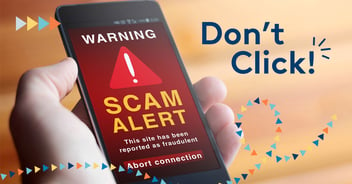
Four Types of Social Media Posts that Could Endanger Your Finances
Social media has made it easier than ever to connect with one another—keeping friendships alive, family bonds tighter and communities connected. But this connectivity comes with a potential price, if you’re not careful with the types of information you share. It can be tempting to think that the reach of your posts is limited to your own network, but remember: Anything you share online has the potential to be shared publicly. This means that the information you share for fun might be used by hackers to steal your identity and loot your bank account.
Here are a few types of posts that could put your information at risk.
The Easy Stuff
Let’s start with the low-hanging fruit. Never (ever) share your phone number, full address, passwords or social security number on social media. This may seem like common sense, but consider the fact that hackers and scammers are specialists in gaining their targets’ trust and making them slip up. Make sure you understand who you’re communicating with at all times and if someone begins asking you for personal information, it should put up warning flags right away.
Online Quizzes
You’ve seen them before: Those cute little lists of personal details that often make the rounds on Facebook. What’s your favorite color? What was the first car you drove? What was the name of your first pet? Sure, these can be fun—but they can also be a boon for data miners and hackers looking for ways to get into your private accounts. Think about it. How many of us use our pets’ names in our passwords? Having a pool of our personal information helps hackers make an educated guess about the words and phrases we might use to secure our most valuable assets.
Photos
It isn’t just written information that can help criminals obtain personal information about you. Think twice before sharing photos online. Make sure to pay attention to background details (like the address on your mailbox or your car’s license plate number) that could clue scammers and hackers in on your location, lifestyle or income level. Also consider limiting your friends’ ability to tag you in their photos (check your account’s security settings). The more control you have over what’s out there, the safer your information will be.
Hashtags and Viral Posts
We all like to feel like part of something bigger than ourselves, and hashtags and viral challenges can help us join the larger conversation on issues, highlight a cause that’s important to us and connect with pop culture trends. Again, keep in mind that hackers and scammers prey on this instinct to connect. Posts that can feel like fun in the moment can come back to bite us in the end. If the hashtag or viral trend you’re joining requires you to post personal information (such as your graduation year), consider the risks before jumping in on the trend.
The internet can be a dangerous place, but by keeping these things in mind, you can take precautions to make it safer—and protect the things that matter most.
And when it comes time to grow the wealth you’ve protected by making good decisions online, visit us below to explore your options.

 605-334-2471
605-334-2471


